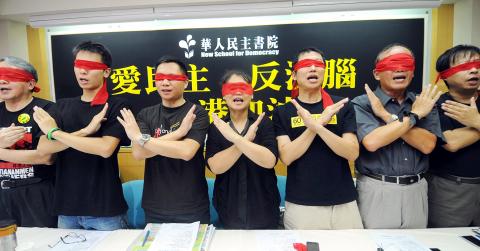Activists in Taiwan yesterday voiced support for the “anti-brainwashing” demonstration in Hong Kong and warned that Taiwan likely faces similar manipulation by the Chinese Communist Party (CCP).
Tens of thousands of people in Hong Kong have demonstrated outside government headquarters this past week demanding the cancelation of a plan to introduce so-called patriotism classes that promote the achievements of the CCP to school curricula.
Wang Dan (王丹), an exiled student leader of the Tiananmen democracy protest of 1989, told a forum hosted by the New School For Democracy in Taipei yesterday that the large turnout for the demonstration on Friday evening showed the deeply rooted dissatisfaction that Hong Kongers feel with the Chinese government. The size of the demonstration also signals that the “one China, two systems” model that has been in place in Hong Kong for more than 10 years is a total failure, he added.

Photo: Lo Pei-der, Taipei Times
“The people do not need ‘national education’ forced upon them by them government. The people can educate themselves on this matter; showing care and concern for society is a basic obligation for all citizens. This kind of civic movement is a re-education for the government,” he said. “On Friday night, 120,000 people in Hong Kong have re-educated their government.”
Wang said he is very optimistic about the outcome of the demonstration, saying it could force the Hong Kong and Chinese governments to make a concession.
“This same situation may happen in Taiwan because some people in Taiwan admire the CCP and are very close to the party,” Wang said, adding that Beijing has attempted to launch “brainwashing” tactics in Taiwan as well.
Lin Fei-fan (林飛帆), a National Taiwan University student and one of the organizers of the anti-media monopoly alliance that has organized a number of protests against the Want Want China Times Group (旺旺中時集團), said at the same forum that while China had ordered the Hong Kong government to enact its thought-control policies, in Taiwan, an enterprise owner was using his media companies to implement the same tactics.
Chu Ping-tzu (祝平次), a professor of Chinese literature at National Tsing Hua University, said that Taiwanese who had lived under an autocratic government know that what was termed as “patriotic education” was in fact repression in disguise.
This type of “education” is not patriotic, nor does it teach anything, but is a method used by the ruling party to promote malignant nationalism to strengthen its grip on power and to get rid of dissenters, Chu said.
In Taiwan, the Chinese Nationalist Party (KMT) government’s decision to proceed with the inclusion of the Four Books (四書) on the list of required material for schools echoes China’s policies of repression and threatens the nation’s democratic education, Chu added.
Taiwanese should be more concerned with how the KMT is altering the national curricula concerning the periods when it was in power and how the party is instilling KMT ideology into campuses, Chu said.
“If we cannot let our students reflect on the historical events that are closest to them, they will not be able to keep an open mind,” Chu said.

‘ABUSE OF POWER’: Lee Chun-yi allegedly used a Control Yuan vehicle to transport his dog to a pet grooming salon and take his wife to restaurants, media reports said Control Yuan Secretary-General Lee Chun-yi (李俊俋) resigned on Sunday night, admitting that he had misused a government vehicle, as reported by the media. Control Yuan Vice President Lee Hung-chun (李鴻鈞) yesterday apologized to the public over the issue. The watchdog body would follow up on similar accusations made by the Chinese Nationalist Party (KMT) and would investigate the alleged misuse of government vehicles by three other Control Yuan members: Su Li-chiung (蘇麗瓊), Lin Yu-jung (林郁容) and Wang Jung-chang (王榮璋), Lee Hung-chun said. Lee Chun-yi in a statement apologized for using a Control Yuan vehicle to transport his dog to a

Taiwan yesterday denied Chinese allegations that its military was behind a cyberattack on a technology company in Guangzhou, after city authorities issued warrants for 20 suspects. The Guangzhou Municipal Public Security Bureau earlier yesterday issued warrants for 20 people it identified as members of the Information, Communications and Electronic Force Command (ICEFCOM). The bureau alleged they were behind a May 20 cyberattack targeting the backend system of a self-service facility at the company. “ICEFCOM, under Taiwan’s ruling Democratic Progressive Party, directed the illegal attack,” the warrant says. The bureau placed a bounty of 10,000 yuan (US$1,392) on each of the 20 people named in

The High Court yesterday found a New Taipei City woman guilty of charges related to helping Beijing secure surrender agreements from military service members. Lee Huei-hsin (李慧馨) was sentenced to six years and eight months in prison for breaching the National Security Act (國家安全法), making illegal compacts with government employees and bribery, the court said. The verdict is final. Lee, the manager of a temple in the city’s Lujhou District (蘆洲), was accused of arranging for eight service members to make surrender pledges to the Chinese People’s Liberation Army in exchange for money, the court said. The pledges, which required them to provide identification

INDO-PACIFIC REGION: Royal Navy ships exercise the right of freedom of navigation, including in the Taiwan Strait and South China Sea, the UK’s Tony Radakin told a summit Freedom of navigation in the Indo-Pacific region is as important as it is in the English Channel, British Chief of the Defence Staff Admiral Tony Radakin said at a summit in Singapore on Saturday. The remark came as the British Royal Navy’s flagship aircraft carrier, the HMS Prince of Wales, is on an eight-month deployment to the Indo-Pacific region as head of an international carrier strike group. “Upholding the UN Convention on the Law of the Sea, and with it, the principles of the freedom of navigation, in this part of the world matters to us just as it matters in the